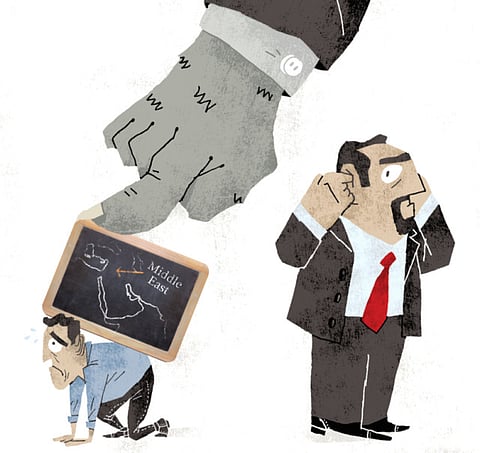Arab states must coordinate efforts to realise common ambition
Victims in Syria, Iran, Palestine; their friends, families — all lost

Analysts the world over are assessing the situation in the Middle East in 2012 by listing the region’s “winners” and “losers.” Hamas won. Egypt’s President Mohammad Mursi won, then lost. US Secretary of State Hillary Clinton won. Syria lost. Iraq lost. Iran had a draw (tougher sanctions, but closer to nuclear-weapons capability), as did Saudi Arabia (growing clout, but unable to stop the killings in Syria or Gaza) and Israel (avoided massive bloodshed, but became even more isolated).
All of these lists, however, are merely the pastimes of policy wonks. In the bloody, hostile miasma of the Middle East, being a “winner”, in any sense of the term, is fallacious. The region continues to breed only losers. The victims of the conflicts in Syria, Iran and Palestine; the friends and families of the victims; those who hope for peace: All lost. This is a grim reminder that when it comes to killing one another, repeatedly missing opportunities for peace and botching all efforts at progress, no one can beat the Middle East. In 2012, the region proved once again that it is truly the best at perpetrating the worst.
When will these vital, eclectic and prosperous (or potentially prosperous) countries stop their ravenous infighting and start nurturing, protecting and sustaining their people? While there have been many prescriptions, I will provide my own 2012 Middle East roundup, with a look towards what must happen in 2013, if we want it to bring fewer losses.
The Israeli killing machine must be stopped by a determined US using its leverage to bring about implementation of the land-for-peace principles of the UN Security Council resolutions 242 and 338, the Madrid Conference, the Oslo Agreement and the Abdullah Peace Initiative. This is the only way out of the current unworkable predicament.
Borrowing a term from nuclear strategy, the situation between Israel and the Palestinians can be described only as “mutually assured destruction,” also known, fittingly, as MAD. It benefits no one, so why let it continue? Only the US has the ability to push the Israelis out of their MAD-ness, so I look forward to the Obama administration recognising and acting on that moral obligation in the coming year.
The Bashar Al Assad killing machine must also be stopped. In this case, it is through the West agreeing with Saudi Arabia to arm the Free Syrian Army (FSA) with the defensive weapons that it needs to ground Al Assad’s aircraft and immobilise his tanks and artillery. Unlike some conflicts in the region, this is a case with a clear and simple solution. Those being attacked merely need weapons to defend themselves; if they get them, the entire dynamic of the conflict will shift, in turn ending the bloodshed.
By now, all of the actors in Syria are known. There are no hidden jihadis, terrorists or gangsters. They are all well documented. So the moderates are the ones who should get the anti-aircraft and anti-tank weapons. Having them, their prestige among other fighters will soar and so will support for their moderate stance.
Iranian intervention in Iraq must stop. It is tearing Iraq apart and endangering the countries around it. Western and Iranian support for Nouri Al Maliki’s government, which is controlled by Iran’s Basij militia, must be withdrawn, enabling the Iraqi people to determine freely their own destiny. Did the Americans defeat Saddam Hussain and did more than 100,000 Iraqis die in the process, so that their country could become a puppet of the hostile Iranian regime? Iran’s meddling in Bahrain, Kuwait, Yemen and other Gulf states must end as well.
In addition to these major tasks, Palestine’s main political rivals, Hamas and Fatah, must reconcile and turn their united efforts towards improving the lives of the Palestinian people. Egypt must get over its post-revolutionary squabbling and reassume its leading role among Arab states. And all Arab states must coordinate their efforts to realise common ambitions, rather than continue to pursue only narrow national interests.
Central to all of these tasks is a Gulf Cooperation Council (GCC) that is united into a confederation that can meet the challenges of Iran’s regional ambitions and bring major military deployments to bear on regional conflicts. If anything has become clear in the last year, it is that states like Israel, Iran and Syria will act with impunity if no one is ready, willing and able to stand up to them. It is time for the GCC, anchored on Saudi Arabia’s power, to take up that role.
The Middle East has been losing for too long, because its national leaders have been seeking to win in their own way, for their own purposes and at everyone’s cost but their own. Such unilateralism is impossible in today’s globalised world. We must join together or else we will rip each other to shreds. The choice is simple: Do we want to be winners or losers?
— Project Syndicate, 2012
Turki Bin Faisal Al Saud, Chairman of the King Faisal Centre for Research and Islamic Studies, was the director general of Al Mukhabarat Al A’amah, Saudi Arabia’s intelligence agency from 1977 to 2001, and has served as Saudi Arabia’s ambassador to the UK and the US.
Sign up for the Daily Briefing
Get the latest news and updates straight to your inbox

